Disney is a media industry with no doubt. However, the perception that Disney is only a producer of children’s content is long gone. The company has managed to multiply by 10 its market capitalization in 10 years and I believe it will do it again in the next 10 years based on 3 factors: content, entry in new businesses, and spillover effects on current businesses.
CONTENT
Disney has been making movies for almost a hundred years. They have been movies for all the family but targeted to kids, which are the ultimate decision-makers when going to the movies. This is an example of the classical content they were producing up until the last 10 years.
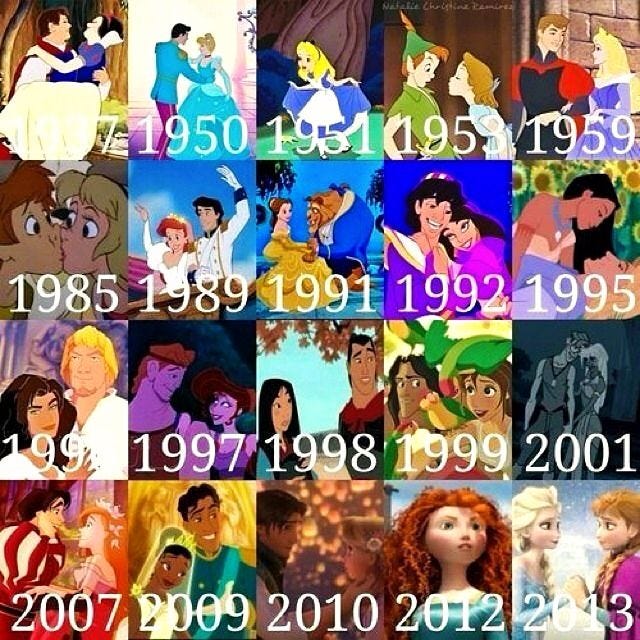
Despite having a powerful content library, Disney has amassed the most impressive collection of content in the world via acquisitions:
- 21st Century Fox: 71B
- Lucasfilm (2012): 4B
- Marvel (2009): 4B
- Pixar (2006): 7B
- Hulu (2009): ??. They acquired 30% and an additional 30% with the acquisition of Fox
With the recent acquisition of Fox, there are only big four other movie studios left in the market: Sony, Warner Bros, Universal, and Paramount.
Just to give perspective. This is the list of the top 3 grossing movies for the last 3 years. Spoiler, they are all from Disney:
- 2017: Star Wars The Last Jedi (rubbish if you ask me), Guardians of the Galaxy 2 (not great) and Beauty and the Beast.
- 2018: Black Panther, Avengers: Infinity War and Incredibles 2.
- 2019: Avengers: Endgame, Captain Marvel and Aladdin (Still not counting with Toy Story 4, Spiderman, The Lion King, Frozen 2 and Star Wars: The rise of Skywalker)
Having content as an asset in the movie industry is relevant because of the fact that over 90% of every year’s Top Box Office Hits are not original. Notice that the 9 hits mentioned above are not original content, including Captain Marvel which is a character well known despite debuting in theaters. Moviegoers are risk-averse and showing characters the public is familiar with is synonymous of success in a market where the production of a movie can cost hundreds of millions of dollars.
Another essential part of the content are the actors. They give credibility to a movie and top talent can’t wait to appear on a superhero movie. Just look at the roster of Avengers Endgame with cameos from the likes of Robert Redford, Rene Russo, Michelle Pfeiffer, Michael Douglas, Natalie Portman, William Hurt, Samuel L Jackson or Ken Jeong, the Asian character on The Hangover. All of this without accounting for the main characters. Where else can you see this?
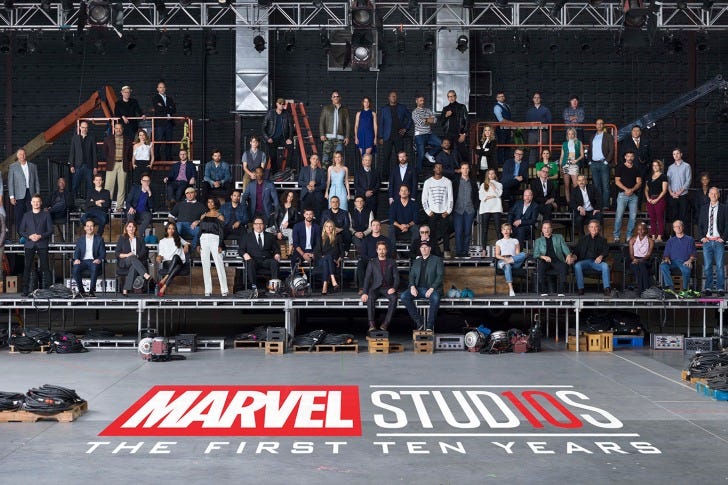
NEW BUSINESS
One of the acquisitions mentioned is Hulu, a streaming platform in the US which also allows watching live content. I believe this is the future. Cable TV operators are doomed. The number of subscriber to Cable TV in the US has declined over the past years.
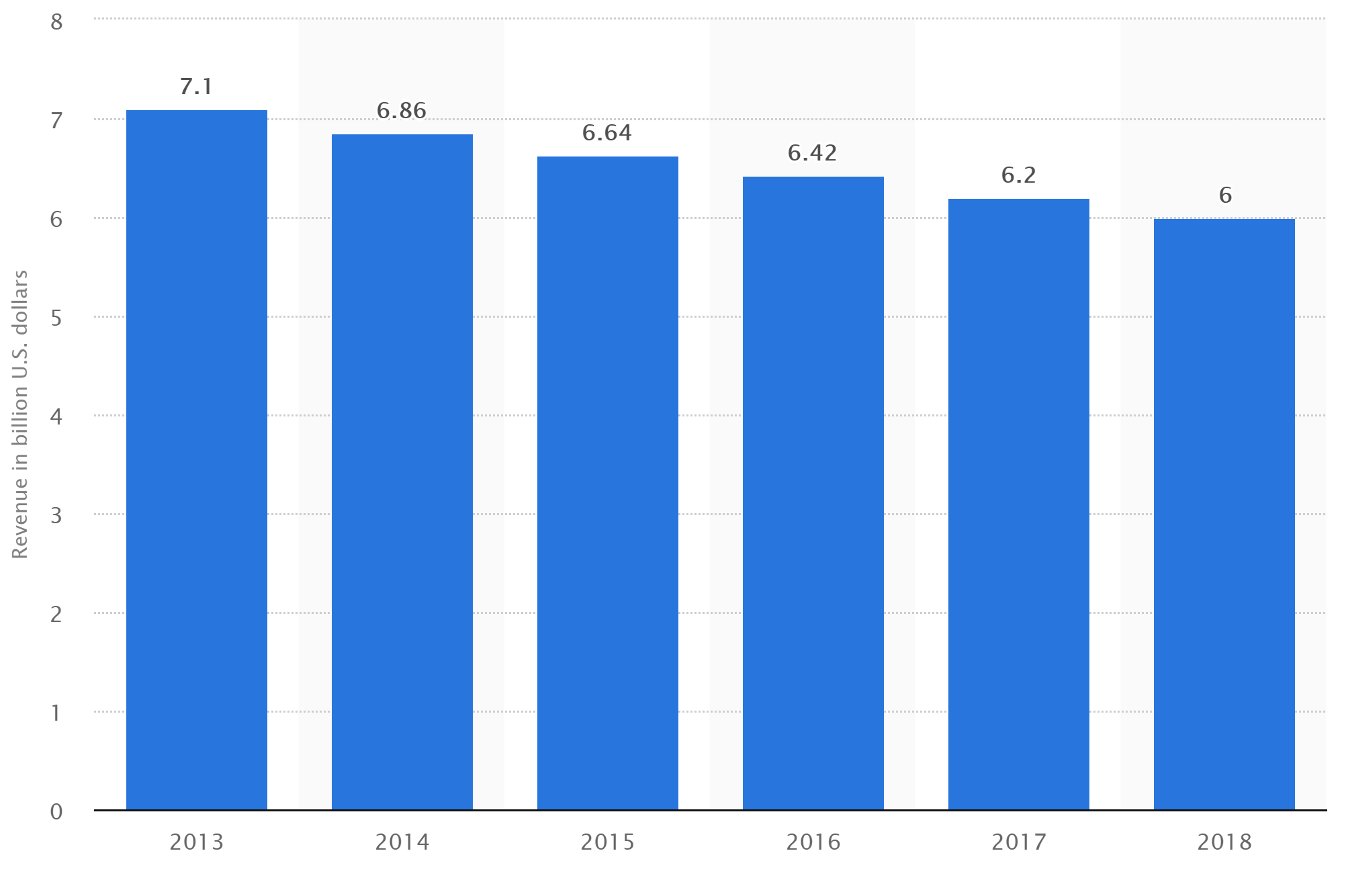
It’s clear the consumers are opting in to streaming on-demand platforms such as Netflix, HBO, Hulu, and Amazon Prime. That’s why Disney is launching Disney +.
This is a global trend. People across the world may not own a TV, but they have smartphones and internet connection. Netflix has launched a 3$ monthly cell-only subscription in India. Check this relentless growth of subscribers by Netflix.
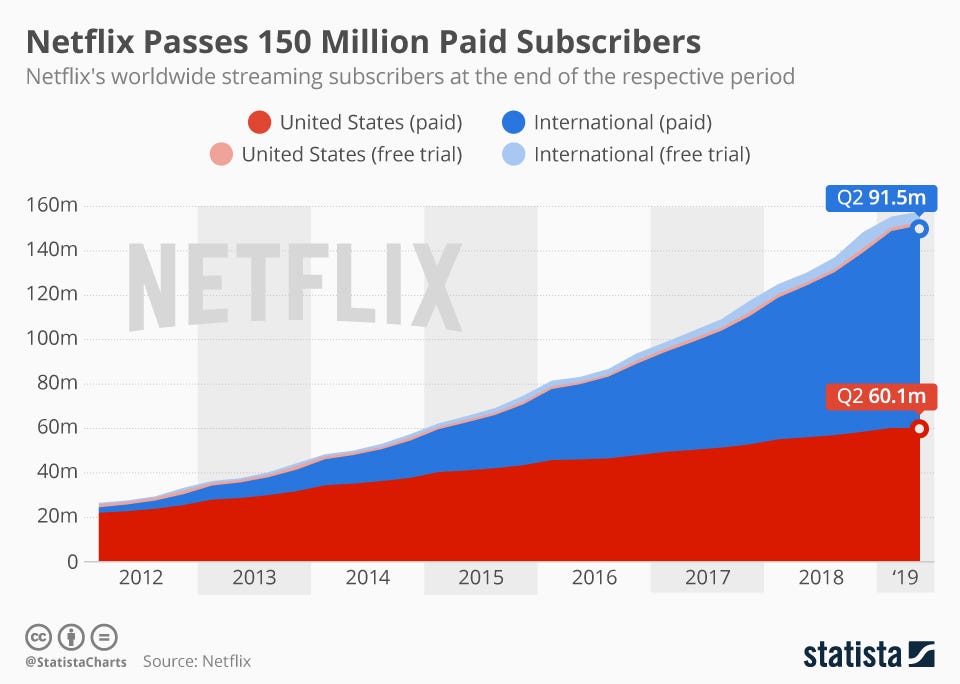
Take a look at the last Shareholders report by Netflix, a public company that is burning billions every year -3,5B$ in 2019- and is expected to invest 15B$ in 2019 alone in new content. In my humble opinion, Netflix has by far the best streaming platform and the content is remarkably good, just look at the masterpiece Stranger Things season 3.
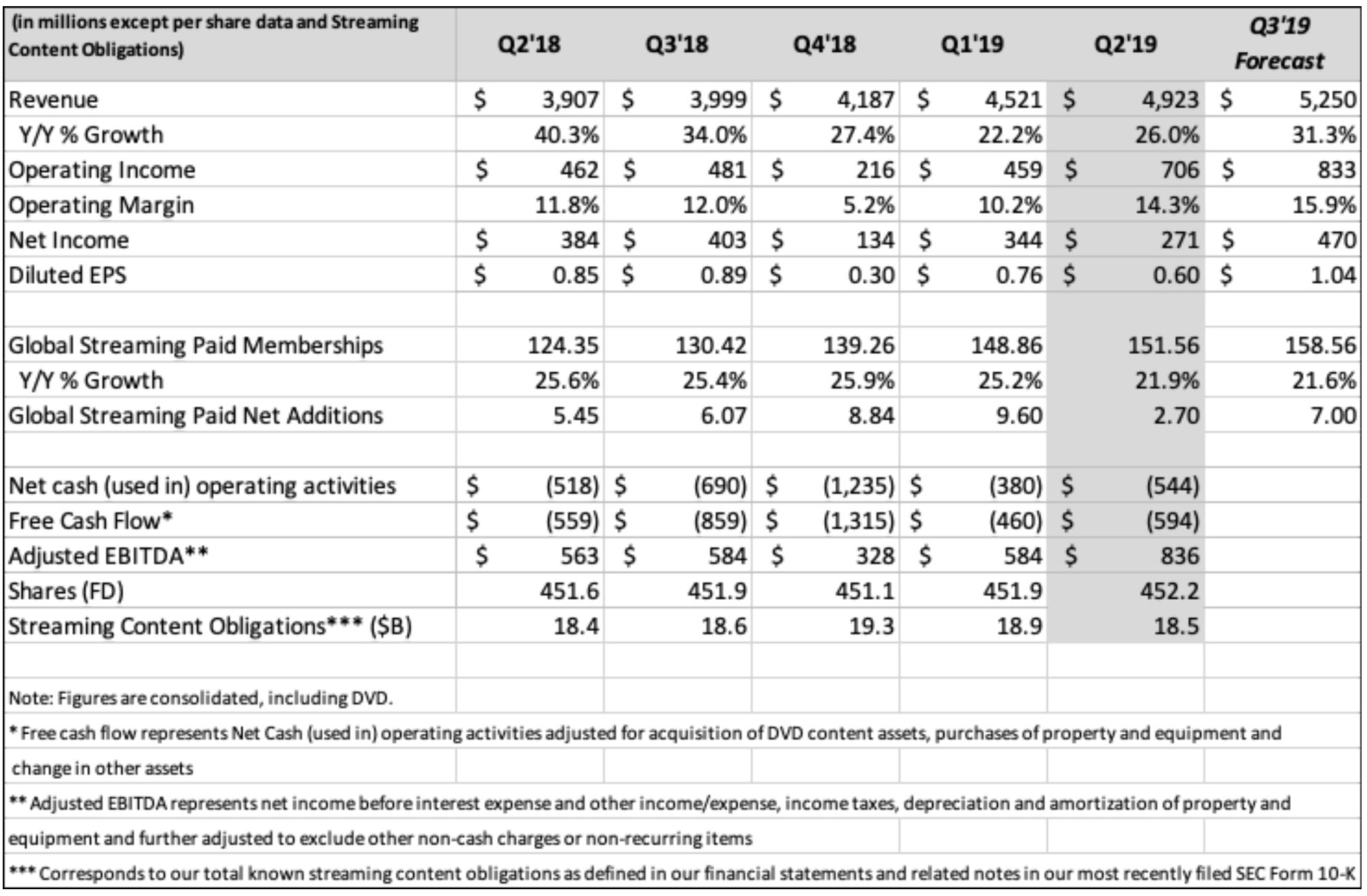
Netflix will be the main competitor of Disney, who will claw back its content from other platforms over the next years, reducing the earnings of licensing rights, but attracting customers to their platform. I believe there will be a time where platforms won’t share much content, but eventually, this will rise opportunities for multiplatform viewing apps and some years from now, platforms will reshare content once they settled a loyal customer base. Users will be subscribed to multiple platforms and they would still like to watch what’s best in every one of them. It’s not a winner take it all market.
My final bet is that there’s another big piece of content that is currently slipping away from streaming platforms, live sports. This is the last resort of traditional TV and cable TV operators who have been able to tell customers when and where to watch TV. This is no more, TV is dead.
SPILLOVER EFFECTS
Let’s get some perspective here. Disney is a corporation that currently (2019) has annual revenues of around 70B$ and a net income of around 13B$ (15–20%). Where do they make money from? This is a comparison YoY between the fiscal years ended on September 30th. of 2018 vs 2017. All areas grow except for merchandising. Figures in B$.
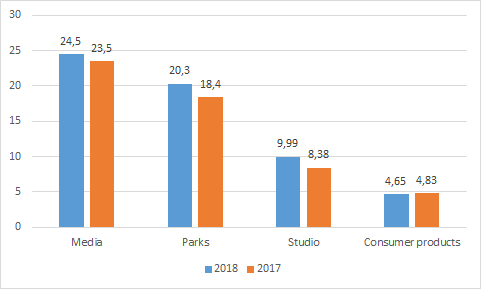
MEDIA
The main source of income is Media Network, which comes from ESPN, Disney Channel, ABC… Here’s the evolution of this revenue stream fro the last decade.
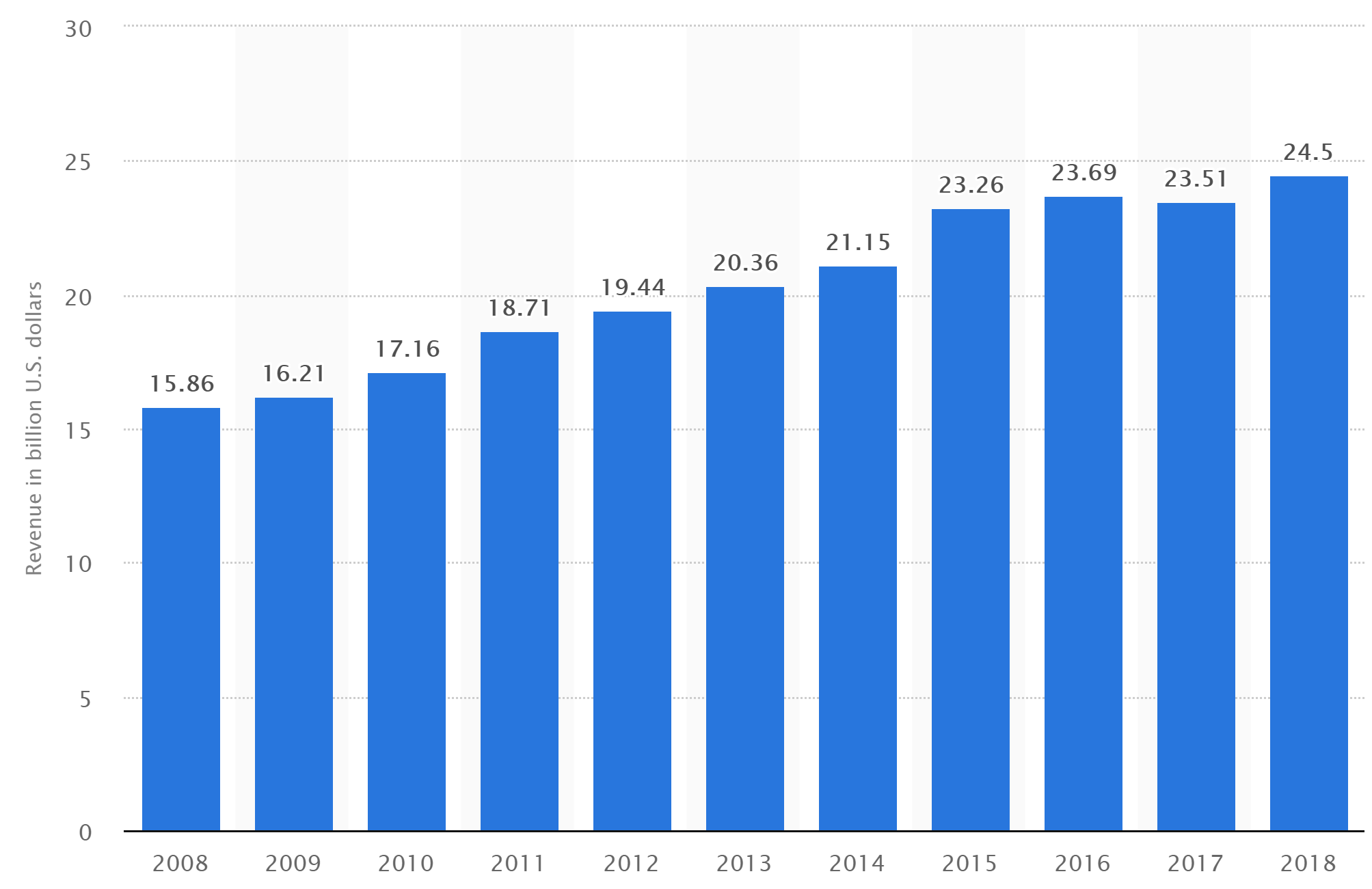
With the acquisition of Fox, this chart is going to experience a huge vertical shift.
PARKS AND RESORTS
Parks and resorts are the second biggest revenue stream of the Mickey Mouse company.

This is a chart with the number (in millions) of yearly by visitors by each park. Around 150 million people go to a venue managed by Disney somewhere on the planet. This can only be achieved by a great hospitality experience and the best content:
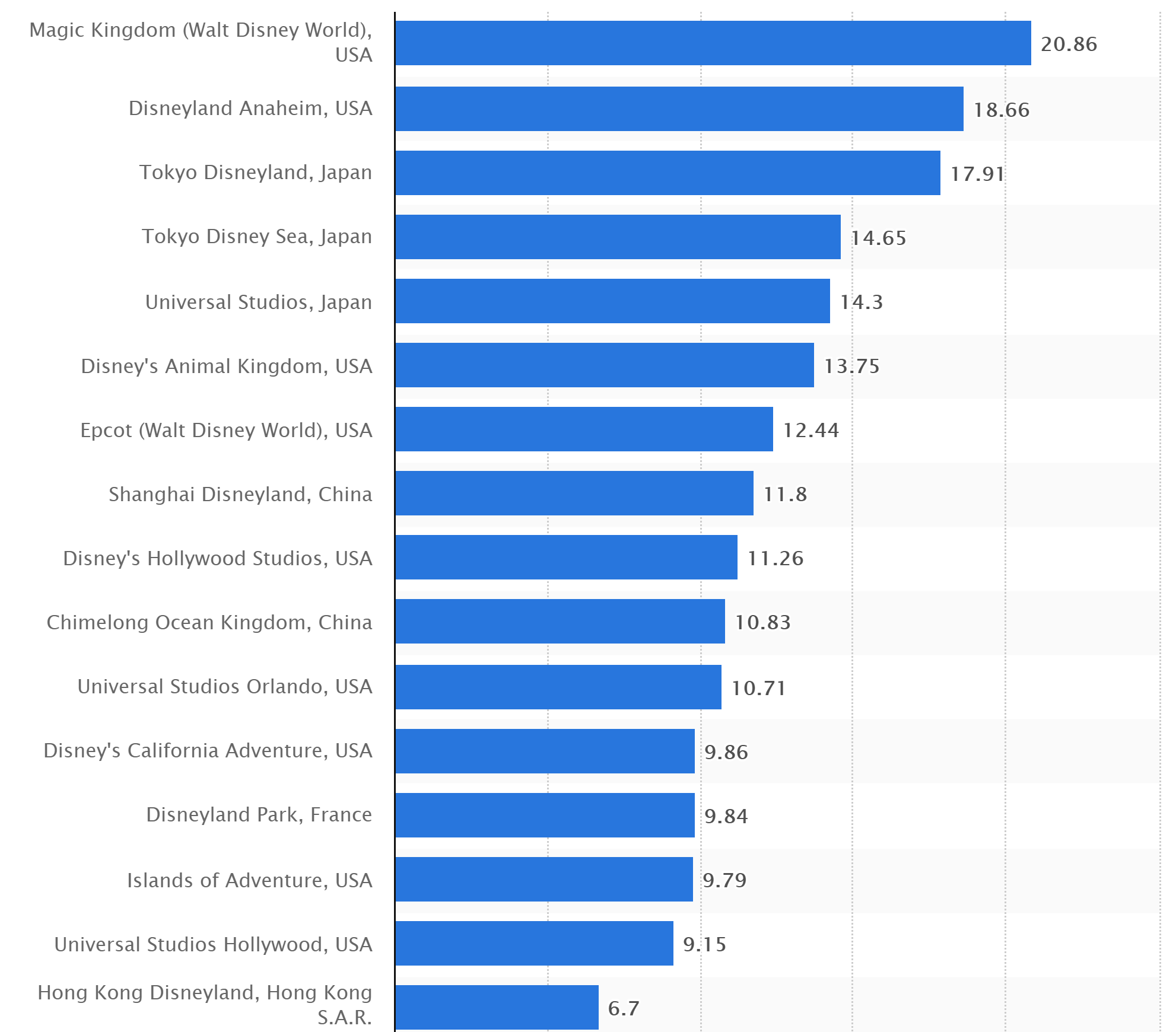
STUDIO
This is the revenue that comes from the distribution of movies and music.
The chart below displays the Box Office market share evolution. Disney has managed to multiply by 2,5 in ten years, and now with the inclusion of Fox, the market share could get just shy of 50%, which is ridiculous. This is a major spillover effect from the massive content acquisition.
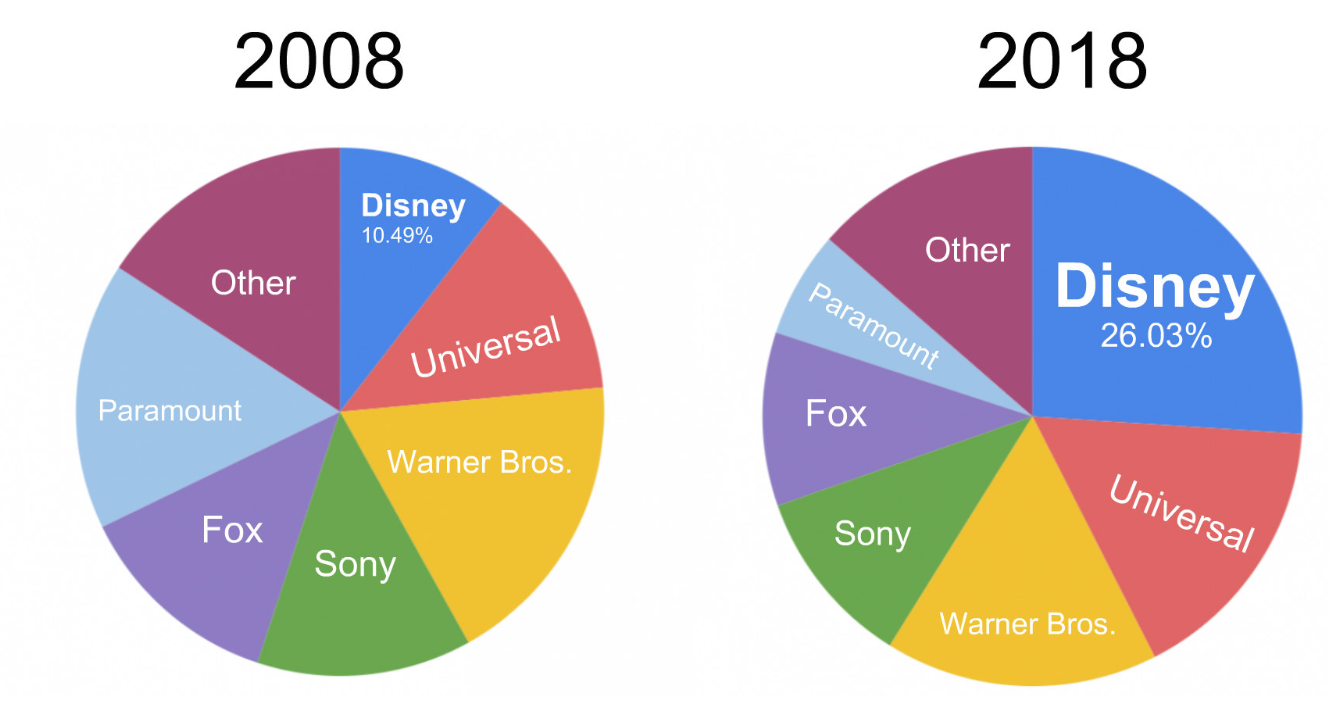
DIRECT TO CONSUMER
This is where the new platform Disney + will come into play. Disney + is a SVOD (Subscription Video on Demand) as far as we know. Other alternatives are AVOD (Advertising Video on Demand) where the users access for free but get adds (Youtube) and TVOD (Transactional Video on Demand) which is what Google is doing among others.
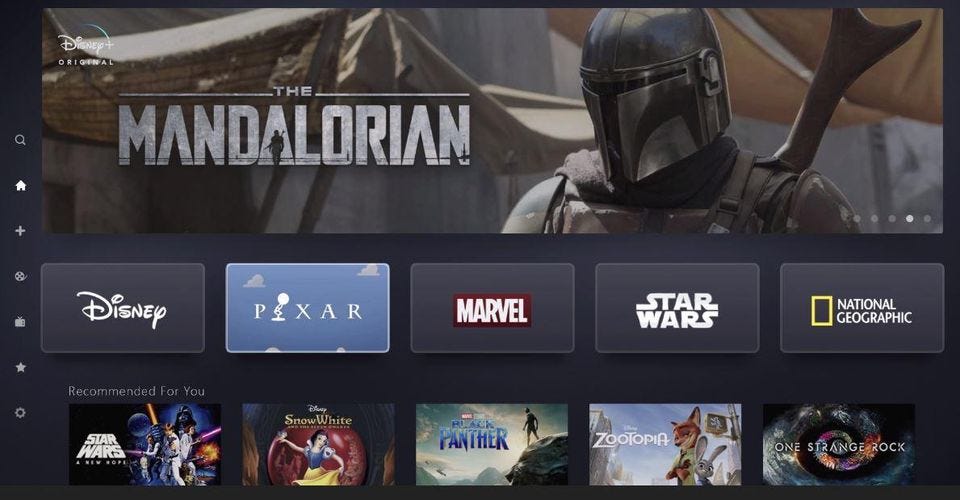
So far they have had Hulu in this category, but with the introduction of Disney +, this will become of the main revenue streams for Disney. Eventually, the main one if you ask me. My guess is that in one year, Disney + can produce revenues of about 20B$ and grow from there. This is what Netflix is doing right now.
The advantage of Disney + is that they already have the content and they would only need to produce specific content for the platform such as The Mandalorian or the Marvel spinoff series with Black Widow and more. That would imply big operating profits since most content has already been amortized. The downside, however, will be the loss of the licensing revenue they get from streaming onto other platforms included in the Studio section. I’m betting this will be a money-printing machine.
CONCLUSION
Disney is a media industry, a company that has endured through decades, and over the last years has taken on a path of content acquisition and generation that pays off very well. This is why I am “holding” on its stock.
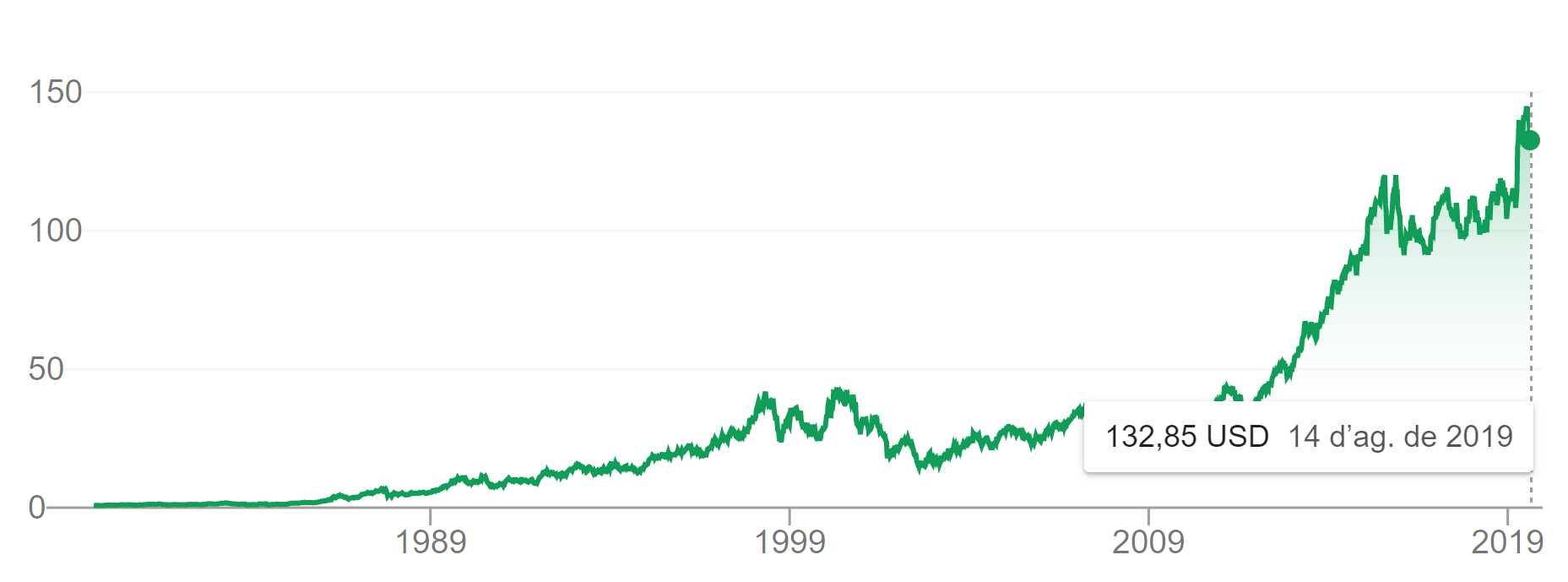
Very nice article. Why do you think Disney can get 20B$ in a year?
Since also Netflix is growing a lot, you believe they will be able to surpass Netflix in 2 or 3 years?
Thanks in advantage
Thank you for your interest Antonio. Netflix will sell 20B$ this year, which is why I believe Disney, with all the content they have amassed, will at least equal that figure in 12 months. These are my personal assumptions:
1. Disney’s content can be viewed several times. I’ve watched Frozen or Mohana with my daughters more than 10 times each. Once we get this subscription into our home, it will be impossible to churn.
2. The content also overlaps. Look for example at the X-men, which can be mixed with the rest of the MCU (Marvel Cinematic Universe) after the acquisition of Fox.
3. This acquisition of Fox has provided with lots of content for different customer segments that will come in handy in such a platform.
4. Disney is a global brand, they won’t require the same marketing budget for it, it’s one of the rare cases where people are expecting it.
The big challenges are 3 in my humble opinion:
1. How they will increase ARPU? They are starting below Netflix, at 7,99$, which is a bargain
2. Will they be able to create a usable platform? Or will they have an Prime-like blunder?
3. Will they be able to create good quality content like series with a lower budget? I remember some spinoffs that didn’t work quite that well. This year they have major ones with huge budgets such as The Lion King and Aladdin, which are targeted to movie theaters.
Soy relativamente nuevo en el mundo del stock pero creo firmemente que por el volumen de licencias y franquicias con las que disney cuenta actualmente la salida de su plataforma será un fuerte golpe para Netflix y demás competidores, incluso concuerdo con el título de tu artículo. Mi pregunta en este caso es la siguiente, en tu opinión personal, cuando sería buen momento para invertir en acciones de disney? Espero tu respuesta y felicidades por tu artículo, muy completo.
Gracias Alex, mi estrategia como inversor modesto es apostar por modelos de negocio que tienen una ventaja competitiva a largo plazo, como es el caso de Disney. Por eso, y como menciono en el artículo, es una apuesta a largo plazo y compraría asap. A modo oportunista, los mercados siempre experimentan fluctuaciones ocasionadas por movimientos de grandes fondos de inversión que pueden generar movimientos diarios inferiores al 5%. Por eso, lo que hago personalemnte es esperar a que Trump diga algo que haga bajar la bolsa y comprar en este momento, pero el objectivo nunca debe ser a corto plazo y para seguir esta estrategia se deben dejar las acciones quietas in leverage y esperar años. Además, hay cada vez más indicadores que indican que viene una recesión, por lo que es probable que la bolsa en general baje en los próximos meses/años (insisto, no tengo ni idea, es solo un gut feeling, y no me responsabilizo de ninguna inversión que haga nadie, solo comparto mi opinión).
En cuanto a Netflix, también comento en el artículo que el futuro va hacia usuarios con múltiples suscripciones, y hasta agregadores que aún no existen. En USA, hay muchos consumidores que pagan en suscripciones más de 100$ al mes, imagínate el dinero disponible después de cancelar el Cable TV. Netflix es 100% compatible con Disney+, como lo será Spotify o el gimnasio.
Interesting story related to this article https://www.nytimes.com/2019/08/22/opinion/netflix-hulu-cable.html
I believe this is one of the so much significant information for me.
And i’m happy reading your article. However want to
observation on some common things, The web site taste is
wonderful, the articles is in reality excellent : D. Good activity, cheers
hello!,I really like your writing very so much!
percentage we keep in touch more approximately your article on AOL?
I need an expert in this area to resolve my problem. Maybe that’s you!
Looking forward to peer you.